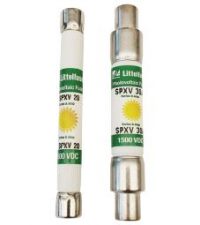
Fuses are essential electrical components designed to protect electrical circuits and devices from overloads and short circuits. They act as safety devices that prevent excessive current from flowing through a circuit, which could otherwise lead to equipment damage, fire hazards, or system failure. In this article, we will explore the different applications of fuses, their general function, and why they are crucial in ensuring the safety of electrical systems.
What Are Fuses and How Do They Work?
A fuse is a simple yet vital electrical safety device consisting of a metal wire or filament that melts when excessive current flows through it. The fuse is connected in series with the electrical circuit, and when the current exceeds the fuse’s rated capacity, the metal wire melts, interrupting the flow of electricity and preventing potential damage. Once a fuse blows, it must be replaced to restore the circuit.
Fuses come in various sizes, types, and ratings, and the correct fuse for a particular application depends on the voltage, current, and specific requirements of the electrical system.
Applications of Fuses
Fuses are used in a wide range of applications across various industries. Below are some of the most common uses:
Home Appliances
Fuses are often used in household appliances, such as refrigerators, microwaves, and air conditioners, to protect the internal electrical components from damage caused by electrical surges or short circuits. In these applications, fuses help prevent fires and ensure the safe operation of everyday devices.
Automotive and Vehicle Electrical Systems
Vehicles, including cars, trucks, and motorcycles, rely on fuses to protect their electrical systems. Fuses in automotive applications protect circuits that control lights, power windows, and other electrical features from excessive current. When an overload occurs, the fuse blows, preventing damage to sensitive electronics and wiring.
Industrial Machinery and Equipment
Industrial machinery and large electrical equipment often require specialized fuses to protect against overloads and short circuits. Fuses in these applications are crucial for safeguarding complex systems such as motors, transformers, and control panels. They prevent costly downtime and damage to expensive industrial equipment.
Consumer Electronics
Electronics such as televisions, computers, and audio systems rely on fuses to prevent damage from power surges or faulty wiring. These fuses help ensure that sensitive electronic components are not subjected to excessive current, which could lead to permanent damage.
Power Distribution Systems
Fuses play a key role in power distribution systems, such as substations and electrical grids. In these systems, fuses protect transformers, circuit breakers, and distribution lines from faults. High-voltage fuses are critical in preventing widespread electrical outages and maintaining the integrity of the power grid.
Renewable Energy Systems
In renewable energy applications, such as solar and wind power systems, fuses are used to protect the electrical circuits from overloads or short circuits. Solar panels and inverters are sensitive to electrical faults, and fuses help prevent equipment failure, ensuring that the system operates safely and efficiently.
Medical Equipment
Fuses are used in medical equipment to protect against electrical hazards, which can be particularly dangerous in medical settings. Fuses ensure that sensitive devices, such as ventilators, defibrillators, and imaging equipment, are safeguarded from electrical faults, maintaining the safety of both patients and healthcare providers.
Types of Fuses
There are various types of fuses, each designed for specific applications:
-
Cartridge Fuses: Typically used in industrial and automotive applications, these fuses are cylindrical in shape and come in various sizes and ratings.
-
Blade Fuses: Common in automotive applications, blade fuses are flat, with metal prongs that fit into fuse holders.
-
Glass Tube Fuses: Used in smaller electrical devices like home appliances and consumer electronics, these fuses have a glass tube casing.
-
Thermal Fuses: These fuses are used in devices that may overheat, such as toasters and hairdryers. They protect against excessive heat rather than electrical overloads.
Conclusion
Fuses are critical components in protecting electrical systems from damage caused by overloads and short circuits. With applications ranging from home appliances to industrial machinery, automotive systems, and even renewable energy setups, fuses provide a safety mechanism that ensures the longevity and safety of electrical equipment. Understanding the various types of fuses and their specific uses is essential for selecting the correct fuse for each application. By doing so, you can avoid costly repairs, prevent electrical hazards, and ensure the smooth functioning of your electrical systems.

